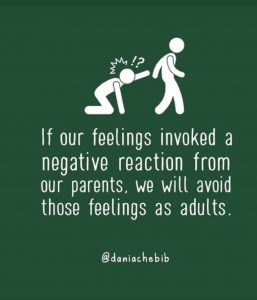Emotional Landscapes and Legacies
I came across the below image yesterday and it really spoke to me. Partly because I’m interested in attachment theory and the quote reminds me of it. And partly, as finding the quote came after a great conversation I had with a friend about the responsibility of parenting and role modelling two nights ago.

Have you ever thought about what your emotional landscape and legacy looks like?
By landscape I mean what emotional responses do you know, often express, grew up around, enjoy expressing (even if they might be negative – some of us love to sulk or become Hulk…), avoid expressing, can’t stand, are you ashamed off etc.? These are the emotions that we have been taught, observed, reinforced and made part of our own emotional arsenal.
By legacy I mean which emotional responses are you known for? When people think of or talk about a particular emotion which would you be associated with? Those are the emotions you most default to and subconsciously pass on to others as your legacy.
Chances are the people who know you best can easily tell you, because you knowingly and unknowingly constantly refer to that landscape and share that legacy in your interactions with them.
Let’s be honest – many of us haven’t necessarily had healthy emotional role models. There are and have been too many opportunities to be offended, hurt, abused by others who have also been offended, hurt and abused by others. But that does not excuse anyone from dealing with and if needs be altering their own emotional landscape and legacy. Just because we may have had parents or communities of origin in which verbal or physical abuse was the default emotional response, does not excuse us from then carrying that legacy on through our adult life.
Emotional maturity is hard to cultivate and maintain – it takes time and effort. But we have a responsibility to ‘re-parent’ ourselves and the global rise of self-help books, counselling, coaching and mentoring services shows that we are catching on to that truth.
This is not to say all or most parents or communities of origin are terrible – but we can agree that no one is perfect and we can be blissfully ignorant of our inherited biases and blind spots when everyone we grew up around has the same.
One of the goals of counselling is to help clients increase their self awareness, because the more you know yourself, the better you can master your life and tackle those biases and blind spots. So, as a gift from me to you on this rainy Saturday (from where I sit), below are some questions for you to reflect on and increase your emotional self awareness.
If you get stuck because you’re not sure of the type of emotions you feel, google ‘list of emotions’ and look at the ones that mean the most to you.
If you end up feeling upset about the results of this exercise, remember, you can always change if you are willing to and there are many great counsellors and psychotherapists who are happy to help you work through issues.
If you’re not sure where to start looking, feel free to message me through my contact page and I’d be happy to help.
Now, here are my questions:
- How would you describe the emotional landscape of your parents/ primary care-givers/ community of origin? Feel free to use colours, tastes/smells, sounds, sensations or other descriptors instead if those work better for you.
- How would you describe your own emotional landscape? Feel free to use colours, tastes/smells, sounds, sensations or other descriptors instead if those work better for you.
- What emotional responses are you proud of expressing and would you be happy to tell or teach others about? Did you inherit them or teach them yourself?
- What emotional responses do you want to improve or stop altogether?
- What emotional legacy do you want to be known for?
